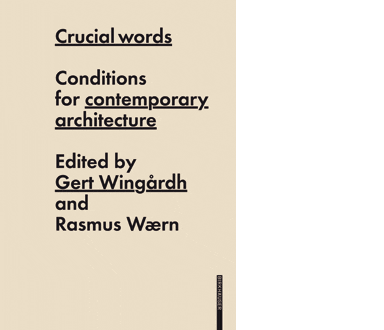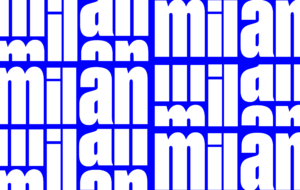
words Justin McGuirk
People rarely like to be reminded that a single word can embody centuries’ worth of shifting meanings. It opens a door onto a black cosmos of uncertainty where nothing means quite what you think it does, so that suddenly all you want is a little sit down
in front of some daytime TV to remind you just how basic life is. But Crucial Words: Conditions for Contemporary Architecture is one of those essential records of how our use of language reflects the time in which we live.
This is a book about “big” words and what they mean to architecture culture. Words that you or I would hate to have to explain, like “body”, “experiment”, “landscape”, “memory” or “technology”. Each one is examined in a short essay by either a well known writer or architect or an obscure Swedish academic (the editors are Swedes, you see). And each interpretation reflects, inevitably, the writer’s moral compass. What’s surprising is just how coherent a worldview these many authors present – and just how critical it is of our era.
The more you read, the more a common thread, an undercurrent of disapproval, reveals itself. It starts in Axel Sowa’s piece on the word “body”, which zooms in on the photographed figure of the starchitect in the media. It gets picked up in Marc Treib’s essay on “formalism”, which states: “We live today in a time of extreme formalism, where form, and form alone, is the prime subject of marketing and designer attention.” Treib’s world of special effects architecture is echoed in Irénée Scalbert’s reading of “ornament”: “The entire corpus of architecture has become decorative,” he writes, citing Zaha Hadid’s “logic of sensation”. Further along, Joseph Rykwert seizes the baton and moves from the roots of the word “technology” in craftsmanship to “the arbitrary and extravagant shapes which advances in technology have now allowed”. Then comes a certain Professor Lampugani arguing that “only the power of tradition can take up the challenges of an epoch afflicted by the tedium of excessive image-consumption”. And finally, in a wonderfully concise piece on memory by Juhani Pallasmaa, the Finnish architect quotes Milan Kundera – “There is a secret bond between slowness and memory, between speed and forgetting” – to argue that we face cultural amnesia.
Again and again, the conditions of architecture production in the 21st century come under attack from advocates of the traditional “humanist” values that have always made architecture more than a mere art form. It is persuasive stuff, though I found myself wondering whether the slightly reactionary tone was a generational thing, since none of the authors is particularly young, or even a Scandinavian thing, but that would apply to only one of the writers quoted above. Perhaps, in a culture dominated by the image, a book about words is by definition going to be conservative – but that’s too depressing a thought to contemplate.
Not all of it is brilliant; there’s a fair dose of the sort of writing that sounds like it’s saying something interesting, if only you could remember what it was. However, there are wonderful moments, particularly when words you think you understand are problematised. Like that word “humanist”. How sweetly innocent of us to load it with all the good in human nature, when, as one writer points out, we are capable of anything.
Crucial Words, Birkhäuser, £19.90
www.birkhauser.ch


















